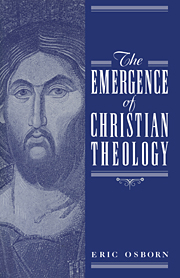Book contents
- Frontmatter
- Contents
- Preface
- List of references
- List of abbreviations
- 1 One God: questions and opposition
- 2 The One and the Mind
- 3 The Bible as the material of theology
- 4 One God as cause and father
- 5 The unity of all things in Christ
- 6 One God in a new way: by the son and spirit
- 7 One good
- 8 One mind, truth and logic
- Conclusion
- Appendices
- 1 Scripture and philosophy
- 2 Recent recapitulation
- 3 Christianity and Platonism
- Bibliography
- Index of modern writers
- Index of subjects
1 - Scripture and philosophy
Published online by Cambridge University Press: 23 November 2009
- Frontmatter
- Contents
- Preface
- List of references
- List of abbreviations
- 1 One God: questions and opposition
- 2 The One and the Mind
- 3 The Bible as the material of theology
- 4 One God as cause and father
- 5 The unity of all things in Christ
- 6 One God in a new way: by the son and spirit
- 7 One good
- 8 One mind, truth and logic
- Conclusion
- Appendices
- 1 Scripture and philosophy
- 2 Recent recapitulation
- 3 Christianity and Platonism
- Bibliography
- Index of modern writers
- Index of subjects
Summary
In one brief and impressive work it is argued that New Testament ideas find in the early fathers a natural, if not final interpretation which relates them to the philosophy of the time. The father of Jesus is the God of Abraham, Isaac and Jacob, transcends man's understanding, but embraces all with his goodness and love. Paul's account of God (I Cor. 8:6) is not far from that of Maximus of Tyre (Diss. 17.5) for whom there is one God, who is king and father of all and many gods or sons of God. Paul insists that ‘for us there is one God the father from whom are all things and for whom we are and one lord Jesus Christ, through whom are all things and through whom we are’. The prepositions (from, for, through) may be translated into causal relations — first, final and efficient (or instrumental). In Rom. 11:36, God is described as all three causes, so that Paul maintains the unity of God and expresses his diversity in terms of causation; like other New Testament writers, he sees some knowledge of God as possible through creation, but all true knowledge coming through Christ.
Ignatius expresses the important paradoxes that the eternal, invisible, intangible, impassible became visible and passible for us (Polycarp. 3.2), to confound the Docetists who by their error point to the identification of father and son.
- Type
- Chapter
- Information
- The Emergence of Christian Theology , pp. 295 - 298Publisher: Cambridge University PressPrint publication year: 1993



